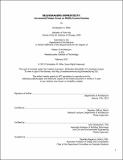| dc.contributor.advisor | Brandon Clifford and John Ochsendorf. | en_US |
| dc.contributor.author | Miller, Christopher M., M. Arch. (Christopher Michael). Massachusetts Institute of Technology | en_US |
| dc.contributor.other | Massachusetts Institute of Technology. Department of Architecture. | en_US |
| dc.date.accessioned | 2013-06-17T19:01:12Z | |
| dc.date.available | 2013-06-17T19:01:12Z | |
| dc.date.copyright | 2013 | en_US |
| dc.date.issued | 2013 | en_US |
| dc.identifier.uri | http://hdl.handle.net/1721.1/79134 | |
| dc.description | Thesis (M. Arch.)--Massachusetts Institute of Technology, Dept. of Architecture, 2013. | en_US |
| dc.description | This electronic version was submitted by the student author. The certified thesis is available in the Institute Archives and Special Collections. | en_US |
| dc.description | Cataloged from student-submitted PDF version of thesis. Pages 172 and 173 blank. | en_US |
| dc.description | Includes bibliographical references (p. 166-171). | en_US |
| dc.description.abstract | Housing today has little do with architecture. Design is a currency of services, while housing today is intensively packaged as a consumer good. It is packaged with land as speculative real-estate, and bundled abstractly into mortgage-backed securities for trade in global investment markets. Both strategies allow people of ordinary means to assume it's monumental cost. Because so very few can buy housing outright, it is built by debt and for debt. This thesis proposes an alternative, in which the critical role of mortgage-financing is directly supplanted by a new set of incremental residential design services. It proposes that middle and low income housing can be not only paid for, but also designed and built during occupancy. Proposed as the centerpiece of a new mode of professional architectural practice, this flexible timeline facilitates reconsideration of housing's materials, labor logistics, and constructional methodologies. The same timeline can accommodate its individual owners' changing needs throughout a progressively tailored and domestically integrated process. Though rental markets may fluctuate, credit scores plummet, mortgage qualifications creep, and income-inequality may intensify, incremental design services can pin the production of housing to that irrespectively distributed and far more egalitarian commodity of time. Given more or less time, these can serve both middle and low income households at equal and unsubsidized standards. The structure of this thesis first elaborates and quantifies the underlying need and argument for designed incremental housing in the United States. It then explores the enabling strategies, attitudes, and issues that arise surrounding three distinct design exercises. These each comprise an approximately eighty thousand dollar magnitude of cash expense, but diverge in value by articulating design logistics as a parallel currency. They are respectively urban, suburban, and rural in setting. They are tailored to a plausibly fictitious clientele of respectively high, middle, and low incomes, and so adopting HUD's definition of affordable housing costs as 30% or less of household income, are conducted in the course of three, six, and twelve years respectively. Their single and central commonality is a complete prohibition of paper debt. | en_US |
| dc.description.statementofresponsibility | by Christopher M. Miller. | en_US |
| dc.format.extent | 173 p. | en_US |
| dc.language.iso | eng | en_US |
| dc.publisher | Massachusetts Institute of Technology | en_US |
| dc.rights | M.I.T. theses are protected by
copyright. They may be viewed from this source for any purpose, but
reproduction or distribution in any format is prohibited without written
permission. See provided URL for inquiries about permission. | en_US |
| dc.rights.uri | http://dspace.mit.edu/handle/1721.1/7582 | en_US |
| dc.subject | Architecture. | en_US |
| dc.title | Deleveraging domesticity : incremental design forays on middle income housing | en_US |
| dc.title.alternative | Incremental design forays on middle income housing | en_US |
| dc.type | Thesis | en_US |
| dc.description.degree | M.Arch. | en_US |
| dc.contributor.department | Massachusetts Institute of Technology. Department of Architecture | |
| dc.identifier.oclc | 844339889 | en_US |
